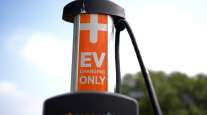Senior Reporter
Bill Shuster Offers Gameplan for Infrastructure Funding

WASHINGTON — To fund a $2 trillion infrastructure package, congressional leaders should ask members of their caucus to come forward with their ideas. From there, debate each funding proposal. Then, select the most viable options while tabling the others.
This bottom-up approach to legislating was suggested by Bill Shuster, former chairman of the transportation policy panel in the U.S. House of Representatives, during keynote remarks at an event hosted by the Intelligent Transportation Society of America on May 15.
“That’s really the way to do it,” said Shuster during the third day of Infrastructure Week, the national advocacy forum. “It’s big. It’s bold, but that’s a lot of money. I’m not sure where they’re going to get it.”

Shuster, a senior policy advisor with lobby shop Squire Patton Boggs, had unveiled a funding plan for an infrastructure measure during his tenure as transportation chairman. Last summer, he proposed raising taxes on fuel to ensure the long-term solvency of the Highway Trust Fund account. He also called for establishing a volunteer vehicle miles traveled program, as well as imposing a tax on bicycle tires.
While Shuster’s plan failed to garner his colleagues’ support, transportation leaders this year have floated some of its key aspects. A few top Democrats are endorsing raising fuel taxes, such as his successor Rep. Peter DeFazio (D-Ore.). Prominent Republicans, such as ranking transportation committee member Rep. Sam Graves of Missouri, lean toward enhancing the fee-based system of charging for miles traveled.
The former chairman, who represented a district in central Pennsylvania for nearly two decades as a Republican, also emphasized that if policymakers fail to reach a $2 trillion top line, an alternative measure of about $1 trillion or less would still be considered formidable.
“I think anything that increases [funding] is extremely important,” he said. “We just haven’t invested in our infrastructure over the last two decades.”
Lawmakers also should stick with traditional surface transportation programs in an infrastructure package, he said. For instance, funding for roads, tunnels, and bridges should be the priority, instead of non-transportation projects. Democratic leaders working with President Donald Trump on an infrastructure package have expressed interest in including climate-change-centric provisions.
House Speaker Nancy Pelosi (D-Calif.), her fellow Democrats in leadership, and Republican leaders are expected to meet with Trump the week of May 20. Pelosi said she will await Trump’s directive on funding for the package.
Democratic leaders met with Trump on April 30 at the White House, resulting in an agreement to proceed with a $2 trillion infrastructure package.




